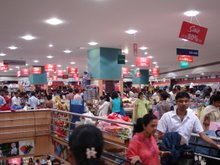Local people’s trust is Tata’s bedrock
THE fact that the earth is round, helps. So if you need to go from any one point to other, you can choose to take the shortest cut or, you can leisurely walk along a very roundabout route to arrive at the very same destination. Depends entirely on your mood and the time you have in hand. Mr R Gopalakrishnan, director, Tata Sons opted for the latter when he met the media in Kolkata on Saturday.
Obviously, he wasn’t pressed too hard for time, till atleast the questions started getting a bit uncomfortable. He was all dressed for the weekend, casual in a white shirt with blue checks as he ambled along a very circuitous 130-year old route to brush past Singur, without actually stopping there. It was a command performance in so far as riddle-making goes and if you thought at the end of it all that he hinted at the Singur land fiasco, it was your thinking entirely...not his.
“The trust of the local community has been the bedrock of Tata group’s business credo in the last 130 years. The economic value of the trust translates into business. When you have this trust, the cost and speed of transaction goes up. Our goddess is not shareholder value. Our goddess is trust.” That was R Gopalakrishnan, director, Tata Sons in an informal chat with media in the city on Saturday. Read it which ever way you like; what Mr Gopalakrishnan meant while sharing the group’s philosophy of doing business for well over a century, is what he said.
“More recently, the Tata brand has been valued at around $7.5 billion. It is perhaps the country’s most valued brand. Its value is built on a bedrock of trust. In a situation where the atmosphere is vitiated, it is difficult to operate. In the past, we have walked out of situations like that, for instance in airlines,” he said.
Asked specifically whether there was a whiff of Singur in what he had said, Mr Gopalakrishnan said there wasn’t any reference to Singur. Instead, he had merely tried to offer a holistic picture of the Tata way of doing business, so to speak. In his own words: “I am here to give you a helicopter view of things as it were.”
In his view a few things stand out. One, the entrepreneurial journey of the Tatas. Few people associate the Tatas with entrepreneurship. But it is a group that has institutionalised entrepreneurship. It has bred a string of professional entrepreneurs like Darbari Seth, Fakir Chand Kohli and others. Each one of them went on to create and build large businesses in their own right. Often in the past, the group has been a pioneer in ventures then considered “nutty” or crazy. When Jamsetji Tata decided to invest to Empire Textile Mills way back on January 1, 1877, also the day Queen
Similarly, then Railway Board chairman Fredrick Upcott who famously remarked he would eat a tonne of steel if the Tatas managed to set up a steel plant and make rails in Jamshedpur, would have suffered severe indigestion. Or when, Jamsetji’s son, Dorab Tata pledged his personal fortune worth Rs 1 crore to seek a loan from the-then Imperial Bank to bail out Tata Steel, which was then already a publiclylisted company.
The Tata attitude towards globalisation is similarly guided by a clear and defined connection between the group’s domestic business and and overseas exposure. “We decide to enter a new market if we have the right IP to suit the place and the context. The Novus truck from Daewoo in
“All this has nothing to do with making the biggest acquisitions. We do a cultural due diligence and attach a great deal of importance to it as much as we do to financial and legal diligence before choosing and bidding for an acquisition,” he said.


No comments:
Post a Comment